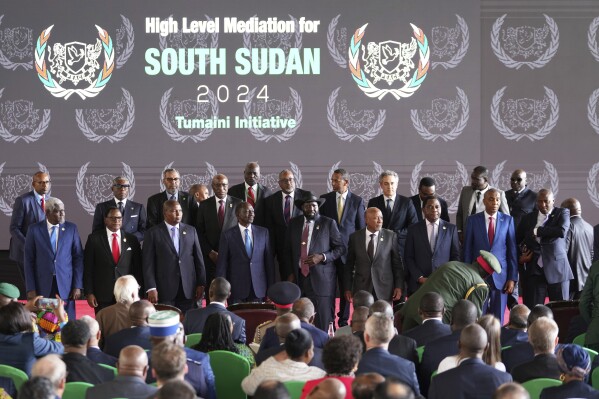South Sudan talks with holdout groups make significant progress
June 11, 2024 (JUBA) – South Sudan peace talks with the holdout groups have made significant progress, raising prospects it could deliver a deal, an official said.
The government official told Sudan Tribune on Tuesday that the parties have started talking about a government and presented a 70-page position paper last week.
The government is negotiating with four different armed and non-opposition parties on the one hand and a coalition of the civil society groups on the other.
South Sudan’s presidential envoy for peace talks with the holdout groups and other stakeholders said significant progress was made in four important areas.
“The first significant progress in the process is the fact that our delegation had presented a 70-page position paper and it has been distributed by the mediation team and the parties have also identified four thematic areas. There have been discussions on governance, on security sector and other areas are being examined. This is significant progress for which our people should be hopeful that there is a light at the end of the tunnel. This is the message”, said Albino Mathom Ayuel.
He said the government delegation was in the talk with open minds and full of confidence that the advance efforts toward a comprehensive peace agreement and end ongoing violence, particularly in the Equatoria region.
South Sudan’s foreign affairs minister also expressed optimism, saying parties to the process have demonstrated a spirit of readiness to reach an amicable settlement of political differences through peaceful dialogue.
“The process is going well. Talks are continuing. This demonstrates a commitment to reaching an amicable settlement of political issues”, said Minister Ramadan Mohamed Abdallah Goch when reached to comment on the talks in Kenya.
Members of the international community have welcomed the start of the talks.
Last week, the Norwegian Foreign Minister Espen Barth Eide urged South Sudanese political leaders to prioritize implementing the existing September 2018 peace deal and address internal issues without relying on external assistance.
Eide met with South Sudanese peace parties participating in the Tumaini Initiative in Nairobi, Kenya, emphasizing the importance of domestic solutions to issues.
“But also, what was said that this should be the last time you need to fly out of the country to come to a different country,” the diplomat said, adding “You need to solve your problems at home.”
He clarified that the Tumaini Initiative shouldn’t aim to replace the 2018 peace deal.
“And I want to underline that a very essential part of what I understand is a common understanding, and I hope I’m correctly informed that this is not a meeting to make a new agreement,” he stated.
Eide stressed his belief in the 2018 pact’s potential to bring peace and stability if implemented effectively.
“You have an agreement, a 2018 agreement. This is about how you implement it to identify what went wrong, what you can do better, how you implement what you already agreed to,” he said.
“This is the task at hand, and that narrows down the scope, but it also makes it clearer what you are here to do. So, I believe in this. I believe what was just said, and I like those words,” he added.
The Norwegian diplomat highlighted the importance of the rule of law and human rights in achieving lasting peace.
“We will support you. We will be with you. But the key is governance. The key is respect for the rule of law. The key is human rights, which should be universally applied to all people,” he said.
Eide urged the leaders to address the economic challenges faced by the citizens.
“And the issues of economic growth and prosperity and how to share the resources of oil, we have a lot of experience in that in Norway, how to manage the economy. That comes once you get your house in order, once you get governance,” he added.
(ST)

